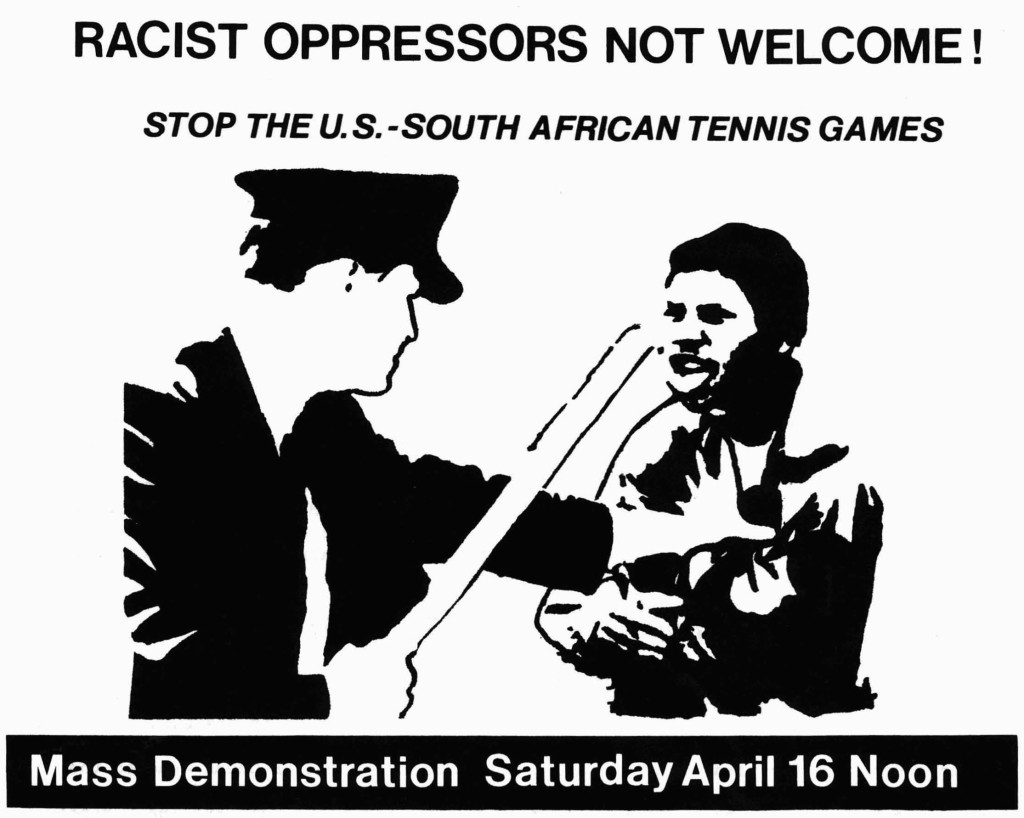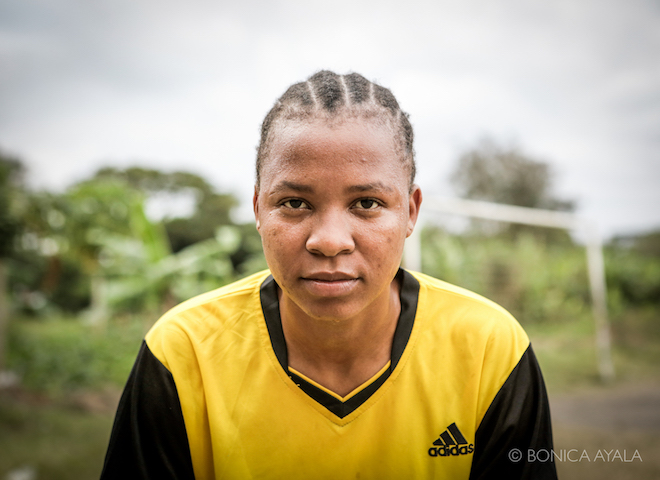
I recently went on a cinematic journey that took me from women’s soccer in Zanzibar to a failed stadium-and-entertainment complex in Buenos Aires.
My travel agency, so to speak, was the Football Scholars Forum. On February 23 it held an online discussion of two low-budget, high-return documentary films. (A recording of the event can be found here. Audio quality improves significantly around the 20 minute mark.)
“New Generation Queens” by Megan Shutzer tells the story of a Zanzibari women’s team. The documentary follows the compelling lives of younger and older women to cast light on the culture of the women’s game on the East African island, which is 99% Muslim. The 50-minute film alternates interviews with passionate players and determined organizers with footage of training sessions on rudimentary pitches. As an historian, I especially liked the remarkable 1988 footage of a Swedish team playing against a local team: the first official women’s game in Zanzibar! After the set up, the film’s main story line becomes the New Generation Queens’ journey to mainland Tanzania for a major tournament. Only the younger players participate in the Under-15 event, an important recruiting venue for the Tanzanian national side. Shaba “Messi” has a lot riding on this competition.
“Ciudad Deportiva—El Documental,” co-produced by Alex Galarza and four Argentine journalists, tells the story of Boca Juniors’ failed attempt in the 1960s and early 1970s to build a 150,000-seat stadium and recreational complex. The 45-minute documentary combines rich archival footage with still photography and interviews, to reconstruct the history of a monumental sports and urban development project. Focusing on Boca Juniors, one of the most popular clubs in the fútbol-mad city (cf. River Plate, Velez, San Lorenzo, among others), and their influential, albeit dodgy president, Alberto Armando, “Ciudad Deportiva” uncovers multiple and complex links between soccer, politics, and urban history in the mega-city of Buenos Aires.
The two enterprising film makers bring impressive academic credentials to their projects. Galarza has a PhD in Latin American History from Michigan State (where I had the distinct pleasure of serving on his doctoral committee), and is currently a Postdoctoral Fellow at Haverford College. Shutzer has a BA from Harvard, did graduate work at Stanford, is fluent in kiSwahili and works in development.
At the Football Scholars Forum, the pair explained the genealogy of their (first) films, narrative choices and production techniques, as well as approaches to film distribution. Notably, Galarza and Shutzer emphasized their commitment to collaborating closely with local people in the filmmaking process. Both spent years doing fieldwork in Buenos Aires and Zanzibar: nurturing relationships, listening to their interlocutors, building trust, and, of course, playing soccer.
The numerous differences between the films make them intriguingly complementary. “Ciudad” is a historical tale told in Spanish by men (though a female narrator) linked to one of the world’s most famous football clubs. “New Generation Queens” is a contemporary story that centers Swahili women’s voices and experiences located at the distant periphery of the global game.
I highly recommend both films. In a glut of English-language soccer media content, these documentaries stand out for their originality and production value. I also intend to use them in my classroom to challenge stereotypes about Muslim African women and to raise questions about the politics of stadium development, past and present.
Author: Peter Alegi
The Promised Land of Leeds
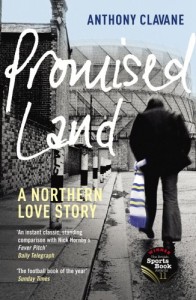 The Football Scholars Forum’s last session of 2017 took place on December 7.
The Football Scholars Forum’s last session of 2017 took place on December 7.
Author and journalist Anthony Clavane discussed his splendid book, Promised Land: A Northern Love Story, which won the 2011 UK Sports Book of the Year award.
Part memoir, part social history, part fútbology, Promised Land is as much about Leeds (the city) as it is about Leeds United (the club). In the publisher’s words: “This is a book about football. It’s about unconditional love for a club, even when it doesn’t always seem to love you back. But it is also a book about much more than that.”
The FSF discussion revolved around the themes of belonging, community, and identity. Football cannot be adequately understood, Clavane’s work shows, without thinking deeply about the social, economic, political, and cultural underpinnings of sport. Leeds and United lent themselves quite well to this kind of analysis, as they embodied broader transformations in English football and society.
Listen to an audio recording of the session here and read live tweets here.
The Football Scholars Forum’s next online gathering takes place on February 23, 2018 (2pm ET). It will explore documentary film as a medium for stories about soccer. For additional information and to participate, click here.
South African Soccer NGO in the Spotlight
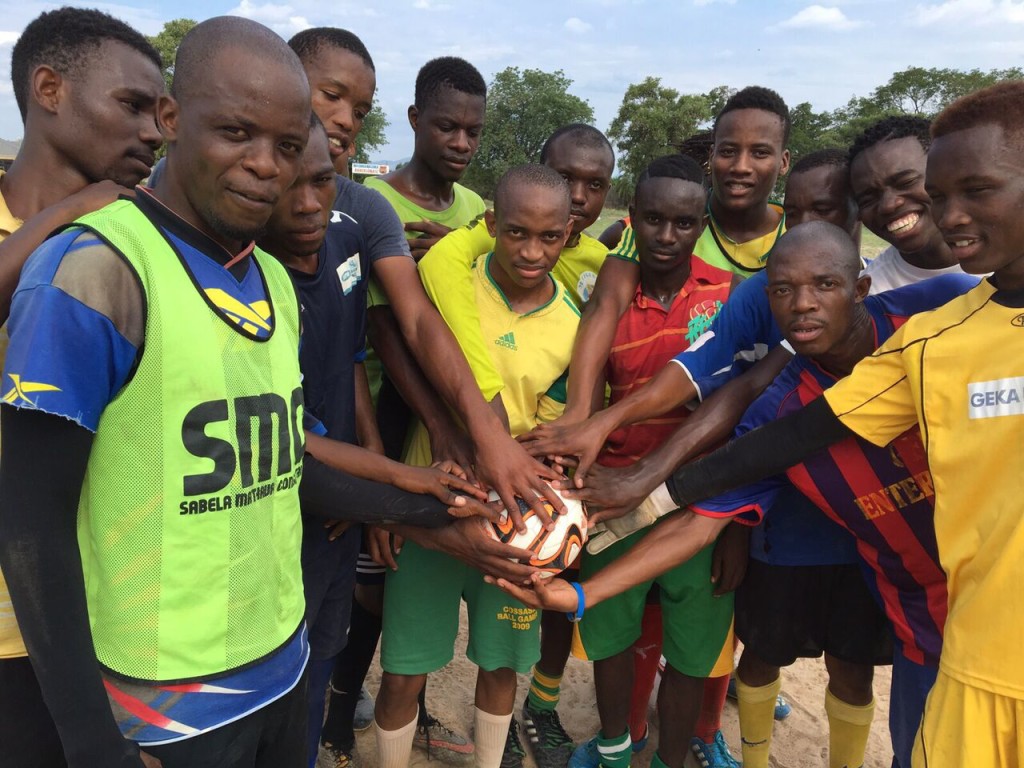
Kabelo “KB” Mashinini, Thabiso “Boyzzz” Khumalo and Thabang “Cosmos” Matsoko are the heart and soul of the Umhlaba Vision Foundation (UVF) in South Africa. In a recent piece published in the Huffington Post, the three men discuss their nonprofit organization that since 2007 has provided local boys with overseas educational experiences through soccer.
“Hailing from the Meadowlands section of Soweto, Mashinini, Khumalo and Matsoko have impacted their community and country significantly over the last decade,” the article states. “What we’re doing,” says Michigan-based Khumalo, “is bringing talented student-athletes here to go to school and then when they do good in soccer and in school, they get two opportunities.”
“Because most of these kids are like me, where I only depended on soccer, and if soccer didn’t work, I hadn’t considered what else I’d do,” Khumalo said, “I decided to create the foundation to help the kids of South Africa and make my contribution to society using something I love and am passionate about.”
UVF has important Michigan connections through Khumalo and sponsors such as Madonna University Athletics, AFC Ann Arbor, Concordia Ann Arbor Athletics, Northville Rush, and Michigan ODP.
Read the full article here.
Nelson Mandela would have been proud of Colin Kaepernick and the black (as well as a few white) U.S. athletes involved in the national anthem demonstrations against police violence and systemic racism. “Sport has the power to change the world,” Mandela believed. “It has the power to inspire. It has the power to unite people in a way that little else does. It speaks to youth in a language they understand. Sport can create hope where once there was only despair.”
This weekend I am presenting a paper that puts some of these issues in historical perspective at the 14th North Eastern Workshop on Southern Africa.
Using a mix of primary and secondary sources, “Sport and Social Justice in South Africa: Historical Reflections” shows how soccer, rugby, cricket and other sports carved out spaces in which to contest white power and raise awareness among athletes, coaches, officials, and fans of the evils of racism. It explores how black (and some white) sportsmen and women, South African and not, over the course of the 20th century worked hard to connect sport to advocacy for equal rights, citizenship, and the reduction (or elimination) of unjust inequalities.
After the rise of apartheid in 1948, a number of sports activists overtly challenged segregation, mainly by launching a global boycott of white South African sport. Sports sanctions, beginning with a FIFA suspension in 1961 and continuing with expulsion from the Olympics in 1970 and eventually from nearly every major sport, propelled the Anti-Apartheid Movement and contributed to the struggle for national liberation.
In the final section, the paper grapples with the impact of the commercialization of sport in the 1980s and 1990s and its changing social and political role during the transition from apartheid to democracy. In doing so, it notes the increasing marginalization of social justice initiatives and discourses in sports. Since the end of the boycott in 1992, the lion’s share of the medals, money, glory, and career opportunities has gone to a few historically advantaged white men and some members of the new black upper-middle class.
For just about everyone else, the pride elicited by Olympic and world champions Caster Semenya and Wayde Van Niekerk sits alongside sport’s fading willingness to meaningfully address inequality and injustice in the age of Jacob Zuma, Marikana, and #FeesMustFall.
Pan-African Sports Studies
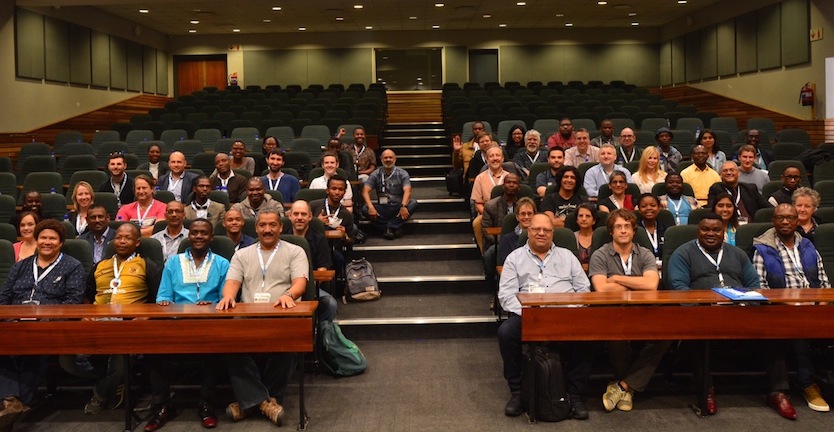
The University of Zambia will host the 12th Sports Africa conference on March 26-28, 2018. The theme of the conference is: “Pan-African Sports Studies: Beyond Physical Education.”
The conference in Lusaka will bring together sports scholars and practitioners from African, North American, and European Universities working on a diversity of topics in a wide range of disciplines.
The event builds on the April 2017 conference hosted by The Institute of Reconciliation and Social Justice at the University of the Free State in South Africa. I joined scholars from around the continent and the world for three days of presentations, workshops, and discussions in Bloemfontein around the theme of “Sporting Subalternities and Social Justice” (see photo above). In my keynote address, “Black Sport Matters: A History of Sporting Subalterns’ Quest for Social Justice in Africa,” I told stories about African athletes, administrators, and fans who used their visibility and influence to make powerful claims for equal rights and to advance a variety of social justice causes. Ranging from the colonial era to the contemporary period, I looked at the factors that motivated African sports activism, strategies and tactics, successes and failures, and connected this history with struggles against racism, sexism, and homophobia waged by black athletes today.
At next year’s conference I may present a co-authored paper with Liz Timbs, which examines aspects of youth sports development in South Africa through a history of the Izichwe Youth Football Academy in Pietermaritzburg, KwaZulu-Natal. More on this project as things develop, of course.
For more information about the 2018 Lusaka conference visit: http://sportinafrica.org/conference2018/
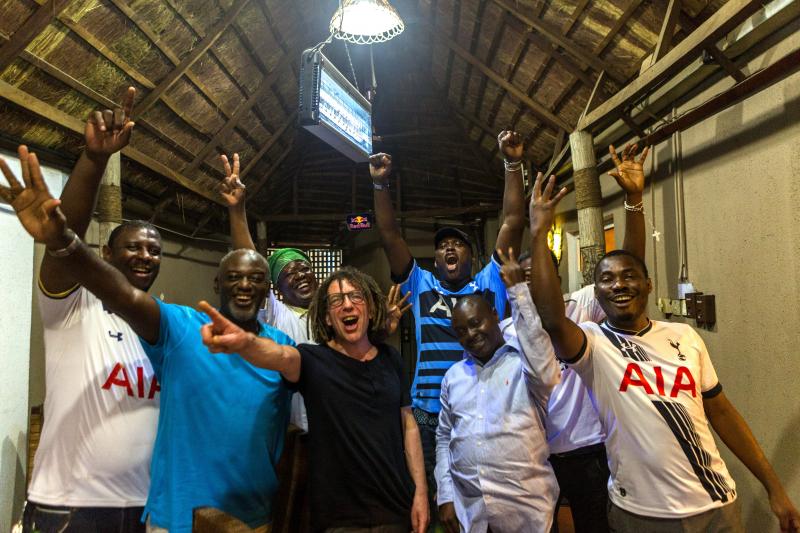
The English Premier League is an obsession for millions of African fans. Author and fútbologist David Goldblatt recently traveled to Lagos, Nigeria, to find out what this cultural phenomenon looks like and why there is such deep reverence for Arsenal, Manchester United, Chelsea, Spurs, and . . . Bournemouth.
In a newly released piece for Bleacher Report, Goldblatt hears from Emeka Onyenufuro, founder of Arsenal Nigeria, who tells him that “Monday to Friday lunchtime, I’m working in my job [as a manager in the power industry], but from Friday afternoon to Monday morning, it is all Arsenal.”
The quality of EPL play and the excitement of watching some of the world’s best players, including N’Golo Kanté, Victor Moses, Yaya Touré, and many other African superstars, partly explains the intensity of local passion for and dedication to the EPL. But another explanation is that the middle-class Nigerian men at the heart of this piece have willingly capitulated to the EPL’s “attention merchants” (Tim Wu docet): “It’s the branding. . . it’s just so professional,” a fan explains.
The author takes us into various public viewing spaces where the South African-owned satellite provider DSTV beams in live games, highlights, and talk shows that collectively stoke the obsessive compulsions of the Nigerian EPL fan. When not watching matches (and praying that frequent power cuts don’t ruin crucial moments in the broadcast), the lads follow their favorite clubs on social media for several hours a day.
The piece also features a fascinating description of the Socialiga, a football and basketball league and “social space to network with their peers, flirt and raise some money for charity.” It left me wanting to know even more about this astonishing kind of grassroots social entrepreneurship.
The Nigerian photographer Andrew Esiebo’s images complement the prose quite beautifully. And Esiebo’s camera does not lie: David Godlblatt seemed most at home in Lagos among his Spurs Nation mates (see photo above).
Read the full article here.
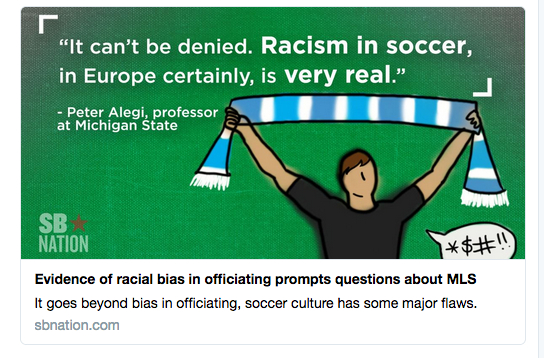
Is there an implicit racial bias in Major League Soccer and other U.S. leagues?
A piercing SB Nation story this week grappled with the implications of a recent study‘s disturbing findings “that black players are 14 percent more likely to be called for cautions than their non-black counterparts.” The study by Paste magazine also found that “black players are [. . .] more than twice as likely to receive red card ejections.”
In the article, I share my thoughts on this important issue with the SB Nation reporter, Tyler Tynes. I point out that “while finding empirical data is difficult, there’s plenty of soft and hard discrimination to believe that bias can take hold in refereeing. American soccer is not excused.” In fact, officiating bias can be understood as part of a broader pattern of racism in soccer, in the U.S. and internationally, one characterized by the practice of “stacking,” the presence of very few black coaches on the sidelines, and multiple forms of racist fan behavior.
“It can’t be denied,” I say in the piece. “Racism in soccer, in Europe certainly, is very real. And, regrettably, despite all the progress that’s been made in terms of messaging and tolerance in local football culture, it’s still there. And everybody knows it.”
But don’t take my word for it, click here to read the full story.
